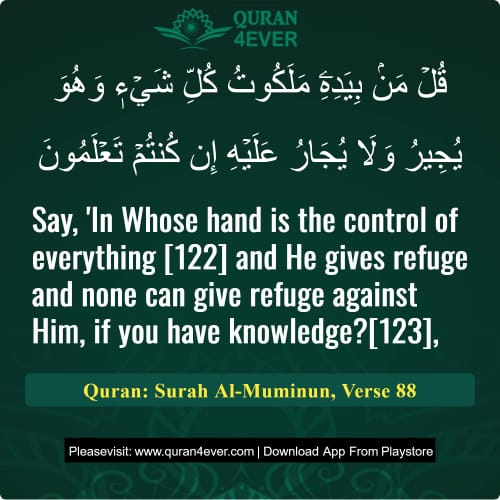
Transliteration:( Qul mam bi yadihee malakootu kulli shai'inw wa Huwa yujeeru wa laa yujaaru 'alaihi in kuntum ta'lamoon )
"Say, 'In Whose hand is the control of everything [122], and He gives refuge and none can give refuge against Him, if you have knowledge?' [123]"
This verse presents another powerful rhetorical question meant to make the disbelievers reflect on the ultimate authority and control in the universe. It distinguishes between territory (ملك) and dominion (ملكوت):
Territory involves external control, like a ruler having authority over lands or judgments such as prison or execution.
Dominion, however, refers to true, inner control—over souls, life, death, sustenance, health, and all creation. This level of authority belongs exclusively to Allah.
While human rulers may control material systems, only Allah owns the dominion of all things.
Allah is the sole source of protection—He grants refuge, but no one can protect against Him. If He wills harm or mercy, no power can intervene. This reality nullifies all claims of intercessors, partners, or rivals beside Him.
Despite acknowledging these facts, many still fell into shirk (polytheism). Why? Because:
They ascribed equals to Allah from among His servants,
Believed that angels, idols, or saints had some share in divine management,
Imagined bluff or pressure could be applied against Allah,
Or falsely believed Allah needed help in managing the world.
Such ideas were rebuked in verses like “And none is the supporter of Him because of weakness” (Surah Al-Isra 17:111).
Even if someone affirms all divine attributes, yet rejects the Messenger ﷺ, they fall into a similar category of shirk. This is because true tawheed (oneness) requires both accepting Allah’s unique attributes and His chosen means of guidance—the Prophet ﷺ as the only valid waseelah.
The tafsir of Surah Al-Muminun verse 88 by Ibn Kathir is unavailable here.
Please refer to Surah Muminun ayat 84 which provides the complete commentary from verse 84 through 90.
(23:88) Ask them: “Say, if you indeed know, to whom belongs the dominion[81] over all things; (Who is it) that grants asylum, but against Whom no asylum is available?”
81. The word malakut in the text is a strong word which combines both sovereignty and ownership. The verse therefore means: Whose is the Sovereignty and Who possesses the real ownership rights over everything?

For a faster and smoother experience,
install our mobile app now.
Related Ayat(Verses)/Topics